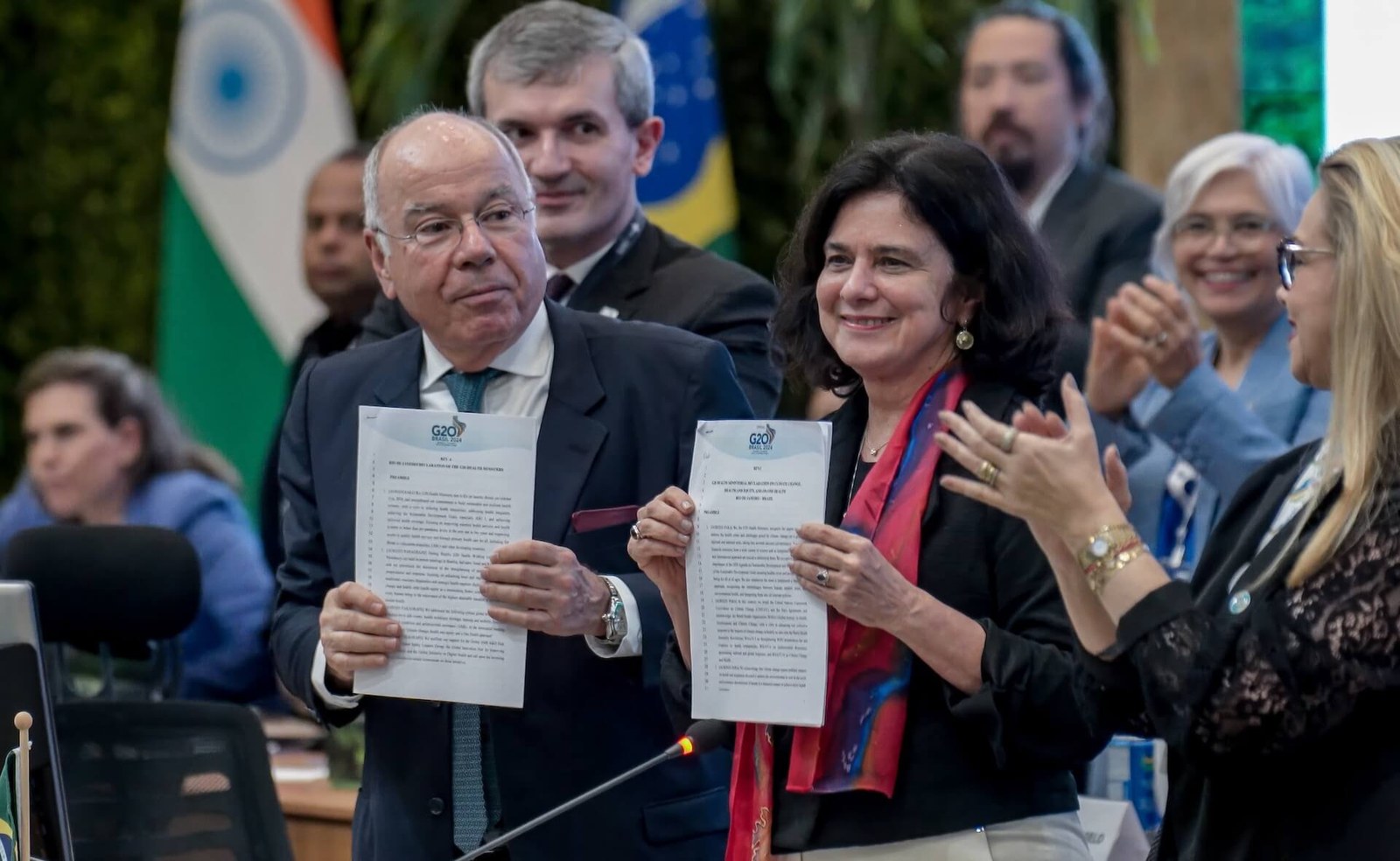G20 Health approves ministerial declaration in support of global health and international cooperation
The document highlights the need for resilient health systems, equity in access, and the importance of addressing long-standing inequalities. Brazilian Minister Nísia Trindade stressed that collaboration between countries is essential to deal with global and local health challenges, including communicable diseases and climate change. The meeting also celebrated the coordination of the Unified Health System (SUS) and social participation in Brasil.

The G20 Health Working Group announced the approval of the Health Declaration at its ministerial meeting in Rio de Janeiro. The document reflects the commitment of member countries to strengthen international cooperation in health, especially in the face of the challenges posed by the Covid-19 pandemic and other health emergencies.
The declaration addresses key themes such as the importance of resilient health systems, interdependence in global health, and the need to address long-standing inequalities that affect the population's health. Ministers of health also emphasized the relevance of promoting public health and ensuring equity in access to health care in all countries.
This approval marks a significant step towards collaborative solutions to improve global health and strengthen response to future global emergencies. During the Brazilian presidency of the Health Working Group, the debates focused on prevention, local production of medicines, and the impact of climate change on health, highlighting the importance of a One Health approach, which integrates human, animal and environmental health.
Health Minister Nísia Trindade emphasized that international cooperation is fundamental in addressing the global and local health challenges that emerge in the wake of the COVID-19 pandemic. She stressed that no country can deal with these issues separately, emphasizing the interdependence in health, which encompasses both communicable diseases and the impacts of climate change. "This declaration clearly states the importance of considering health as a central theme in adaptation and mitigation plans to tackle the impacts of climate change. Proposals related to essential data for the definition of policies in this area were also presented," she explained.
Nísia also addressed the long-standing inequality that affects health conditions, stating that it was essential to discuss the social determinants of health throughout the event. She celebrated the union of efforts around the coordination of the G20 Health, recognizing the importance of the Unified Health System (SUS) and social participation. “I believe these are very important initiatives. Brasil has reinforced its role in global health, emphasizing not only its commitment but also its values. This includes the experience with the Unified Health System and what we can share in terms of principles to promote more equitable global health,” she said.
Ministers also emphasized the need for investments in health to address inequalities and foster sustainable development. They endorsed joint reports and initiatives from the G20, the World Health Organization (WHO), and the World Bank that strengthen the alignment between finance and health, and supported the implementation of amendments to the International Health Regulations. In addition, they highlighted the continued support for the negotiations for a global tool to respond to pandemics and the importance of the Pandemic Fund to strengthen the global capacity to mitigate risks.
Global coalition for local and regional production
The creation of the coalition for local and regional production was announced to facilitate access to vaccines and treatments in low-income countries, emphasizing technical cooperation and technology transfer. Brasil will serve as the seat of the executive secretariat and will preside over the coalition in its initial years, with a rotating presidency planned for the future. Funding will be voluntary, and projects will comply with international laws, promoting innovation without duplicating the efforts of existing initiatives.
In the field of digital health, the G20 recognized the potential of technological solutions to expand access to quality health services while protecting data privacy and security. Telehealth was highlighted as an innovative method for providing health care in remote areas, ensuring continuity of treatment, and promoting disease prevention. Ministers committed to continually improving these services, ensuring their accessibility and effectiveness for all populations.
Brasil will serve as inspiration for South Africa's G20 presidency
At a press conference, South Africa's Minister of Health, Aaron Motsoaledi, thanked Brasil for its G20 presidency. The country on the African continent will host the G20 in 2025. He stressed the importance of the Rio de Janeiro Health Declaration and highlighted Brasil's efforts to promote a robust agenda, which included the prevention, preparation, and response to pandemics, digital health, and the impact of climate change on health, always based on the principle of equity.
The minister mentioned the success of initiatives to improve access to vaccines and health care, as well as the recognition of the transformative potential of digital technology in expanding health services, especially for remote communities. He praised Brasil's focus on raising the voices of marginalized communities and seeking inclusion in health policies, promoting regional alliances for health production and innovation. “South Africa's G20 presidency will follow suit next year, and we have learned a lot from the Brazilian experience. We have set ambitious goals for our presidency, which will be guided by the principles of solidarity,” he stated.
Translated by PGET-UFSC